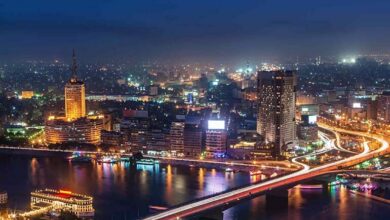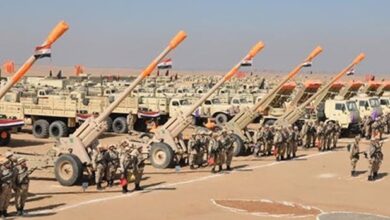On 29 July, a group of around hundred armed men rode into the town of Arish in northern Sinai on motorbikes. They proceeded to attack the central police station, as well as a hospital morgue where they were reported to have taken a body of one of their own, before disappearing back into the desert.
Within a few days, the Supreme Council of the Armed Forces (SCAF) that now rules the country decided — rightly — that the security situation in the Sinai Peninsula had gotten out of hand. It launched "Operation Eagle," sending in new military units into the area to secure police installations, restore order and chase (or at least disperse) the mixture of common criminals, renegade Bedouins and radical Islamists that have sown havoc since last January.
To understand what is happening in Sinai today, once must go back to the situation on 25 January. Unlike the rest of the country, the disturbances of the early days of the revolution had an immediate impact in the area around Arish and elsewhere in north and central Sinai. By 29 January, most police stations and Central Security installations had been attacked, and it was clear that Ministry of Interior employees were not welcome. The attacks were targeted: a police installation would be looted while a Border Guards garrison (i.e. part of the army) next door would remain untouched.
In the first days of February, the military — at a level that probably did not even involve presidential approval — used the ongoing liaison channels with Israel to demand a temporary expansion of the number of units that can be deployed in Zone C of Sinai, where Egyptian military movement is restricted under the Camp David Accords. It was granted and has been periodically renewed ever since, with probably an increase for the recent launch of Operation Eagle.
The presence of additional troops to man checkpoints and other localities probably partially calmed things down in north Sinai for a time. But it was insufficient — not because of the quantity of military troops, but because policing is not what the military does, and in the meantime the regular police never really returned. This meant there was no one to prevent or solve crimes, no one to impose order. Military troops either have a dissuasive role, or are used to fight battles — but they can't solve disputes between families or even accept a stolen property report.
Between February and the 29 July attack in Arish, the three troublesome groups in Sinai — criminals, radical Islamists and disgruntled Bedouins — used this police vacuum to gain ground and do as they please. When dealing with them, each group deserves a different approach.
The criminals — some of them recent escapees from prisons, including local ones that had been "liberated" from the Ministry of Interior in late January as well as from elsewhere in Egypt — have used the chaos to steal. They should be arrested and prosecuted, but there is no police. This means that either the military should assume the role of the police, or create the political conditions necessary for the return of an effective police force.
The radical Islamists — some from local underground Salafi groups, some escapees from prisons elsewhere, and potentially some from abroad (most notably Gaza) — have taken up arms and are issuing pamphlets calling for an Islamic Emirate of Sinai. They have in some cases terrorized the local population, intimidating unveiled women or store owners who do not close during prayer time. They too must be punished according to the law. Other Salafis who have not taken up arms may also be participating in the intimidating behavior, and they also must be dissuaded.
The Bedouins represent a more difficult problem, because their problem with the authorities is multi-faceted. Some of the armed Islamists and criminals are Bedouins, but their issues are quite separate from the larger Bedouin community, which had been treated with disdain and repression by the authorities since the 2004 Taba bombing, when thousands of Sinai residents were arrested and tortured. They also have legitimate grievances against the government for the marginalization of their region, where the natural environment already makes life so harsh.
That General Sami Enan, the number two in the SCAF, met with tribal elders last month is an important symbolic step — a gesture of respect and an indication that Bedouin grievances are taken seriously. But this and the recent legislation rushed by the government to ensure the development of Sinai must actually be followed through, and with the participation of the area's residents rather than as a gift from Cairo. Justice must be also seen to be done towards the hundreds, if not thousands, of Bedouins detained since 2004 who are innocent.
But some of the Bedouins in north Sinai are also involved in illegal activities, from smuggling to Gaza to human traffic to Israel. Entire cars are smuggled to Gaza on a daily basis, while in July alone over 2000 illegal migrants (mostly from sub-Saharan Africa) entered Israel from Sinai. No state should stand for this in its territory; the tribes making fortunes over the misery of Gazans and migrants should persuaded — and eventually forced — to end their activities.
In the short term of Nabil al-Araby as foreign minister, promises were made to open the Rafah to commercial traffic. Doing so, and ending the immoral blockade on Gaza, may upset the Middle East Quartet and Israel, but it is key to ending smuggling. Even Israelis are beginning to realize that restricted sovereignty in Zone C of Sinai has created a lawless land that hurts their security.
The Mubarak regime accepted this condition because its ambiguity allowed room for the contradiction between official and real policy toward Gaza. Post-Mubarak Egypt, while embracing Sinai's Bedouins as citizens, must also make it clear that it will never allow a state within a state to be created on its borders: not by criminal gangs, not by radical Islamists, and not by any tribe.
Issandr El Amrani is a writer on Middle Eastern affairs. He blogs at www.arabist.net.




